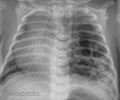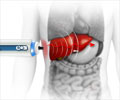Study says an increase in the number of screened carriers for cystic fibrosis (CF) was associated with a decrease in the number of children born with CF in northeast Italy.
A study in the December 16 issue of JAMA says that an increase in the number of screened carriers for cystic fibrosis (CF) was associated with a decrease in the number of children born with CF in northeast Italy.
Some studies have suggested that there has been a progressive decrease in the incidence of newborns with CF in some areas. "A circumstance that might influence CF birth rates is the detection of carrier couples," the authors write.Carlo Castellani, M.D., of the Cystic Fibrosis Center, Verona Hospital, Verona, Italy, and colleagues evaluated the association between CF carrier screening and CF birth incidence in northeastern Italy, where CF neonatal screening has been performed for many years. Since the early 1990s, a significant progressive decrease of CF birth rates has been recorded for this area. In this region, two different carrier detection approaches were identified—the western region, in which CF carrier tests are offered only to relatives of patients or to couples planning in vitro fertilization; and the eastern region, in which carrier testing is offered to relatives and carrier screening to infertile couples and to couples of reproductive age. A total of 779,631 newborns underwent CF neonatal screening between Jan. 1993 and Dec. 2007, of whom 195 had CF detected.
During the study period, a time-related decrease in CF birth incidence was found, with an average annual percentage decrease of 0.16 per 10,000 neonates. The rate of decrease was greater in the eastern region (0.24 per 10,000) than the western region (0.04 per 10,000). In the western region, 2,559 carrier tests were performed; 314 carriers and 9 carrier couples were detected. In the eastern region, 87,025 carrier tests were performed; 3,650 carriers and 82 carrier couples were detected. Carrier rate (number of carriers/number of tests) was 1/8.1 in the western region and 1/23.8 in the eastern region.
"Although CF birth incidence decreased over time in the whole area under study, the number of new CF cases identified each year decreased only slightly in the western region, with its limited carrier testing, and decreased significantly in the eastern region, with its intensive screening of couples of reproductive age. The overall negative trend in northeastern Italy is mainly due to a reduction of CF births in the eastern region. The reduction appears to be connected with the extensive use of mutation analysis in the general population—as the number of individuals screened with the CF carrier test progressively increased, CF birth incidence gradually and constantly decreased," the researchers write.
Editor's Note: Please see the article for additional information, including other authors, author contributions and affiliations, financial disclosures, funding and support, etc.
Editorial: Carrier Screening, Incidence of Cystic Fibrosis, and Difficult Decisions
Advertisement
"For parents, raising children to adulthood promises numerous intangible rewards but exacts substantial personal and financial sacrifices. The years of effort are punctuated by moments worthy of celebration and others that can only be described as harrowing. Raising and caring for a child with CF poses additional complications in all aspects of personal life for all members of a family, and the desire to avoid those extra costs is easy to understand. On the other hand, the improvements in care have allowed many patients with CF to successfully reach adulthood, complete education, and start families and careers. Thus, a suggestion to avoid all births of children with CF seems distinctly discordant with the increasingly common successes within individual lives affected by CF due to continuing progress in treatment."
Advertisement
Source-Eurekalert
RAS












